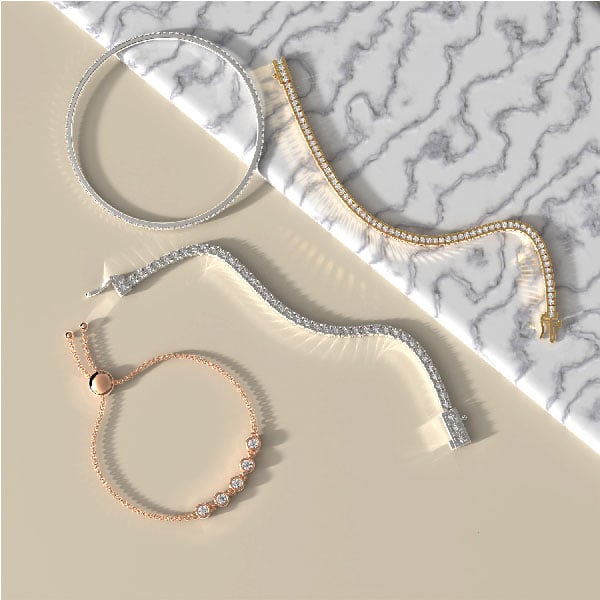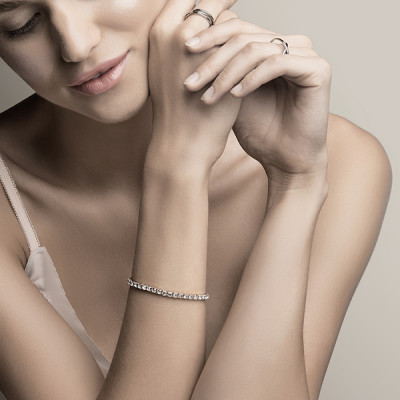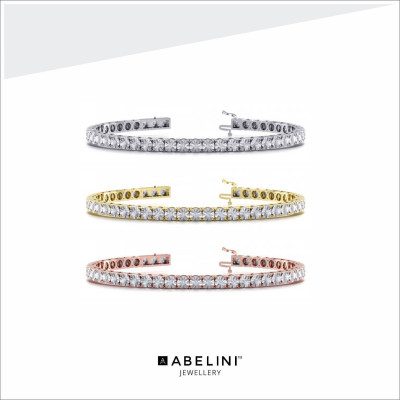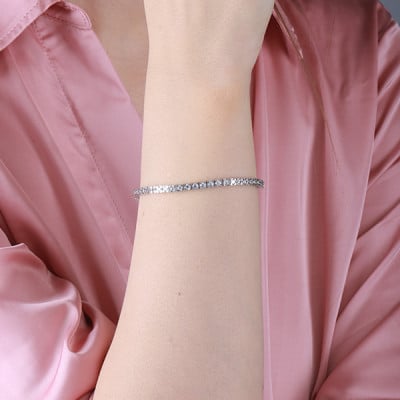Bracelet Size & Fit Guide
Bracelets have been around for centuries - in fact, evidence of bracelet wearing has been found as far back as the cuffed bracelets worn by Egyptians in around 5000 BCE. Worn around the wrist, they're items designed to be seen - both by the wearer and those around them - and their symbolism makes them a fantastic gift for a partner or a good friend.
There are various styles of bracelets, from delicate chain bracelets to bangles, from cluster bracelets to the traditional tennis bracelet design. You'll find diamond bracelets crafted from a variety of metals, and with diamond shapes, sizes and settings to suit all tastes.
If you've been wondering about the symbolism behind bracelets, whether they're still fashionable, how they should fit and how to work out your bracelet size, read on. Our bracelets buying guide will answer all of these questions and more.
How Should A Diamond Bracelet Fit?

First, you will want to decide which wrist your diamond bracelet will sit on. Generally, those who are right-handed choose to wear diamond bracelets on their left wrist, and those who are left-handed wear them on the right. The reason behind this is simple: by wearing it on your non-dominant wrist, it is less likely to be subjected to wear and tear. Of course, this will depend on whether you wear a watch, and on which wrist you wear it, if so. While there is nothing wrong, style-wise, with layering bracelets and watches, by wearing both together you run the risk of one or the other becoming scratched.
You will also want to make sure that your bracelet is neither too loose nor too tight. Too loose, and you risk losing it - too tight, and you will end up experiencing discomfort. As a general rule of thumb, being able to fit one finger between your wrist and the bracelet is a sign that you've found a bracelet that fits perfectly.
Bracelet Sizing - How to Measure Wrist Size for a Perfect Fit?
How Do I Know My Bracelet Size? With your new bracelet in mind, it’s time to focus on choosing the correct size for your wrist. Please follow the guide below for a simple route to finding the right bracelet size for you or your loved one.
1. Get a flexible measuring tape or a piece of string and a ruler.
2. Wrap the measuring tape or string around your wrist where you would normally wear the bracelet.
3. Make sure the tape or string is not too snug but not too tight.
4. Take note of the measurement.
5. If you do not have any measuring tape or string, you can also measure the circumference of an old bracelet that fits you well.
This will provide you with the baseline measurement for your new bracelet – though some bracelet styles best suit a tighter or looser fit.
For a chain bracelet, add around 0.75-1 inch to your wrist measurement when choosing your bracelet size. The rule is similar for cuff bracelets: by adding this extra amount to your wrist measurement, you'll ensure that you don't end up bending the bracelet out of shape when you put it on.
When buying a bangle-style bracelet, you’ll also need to take knuckle measurements into account. Because of the inflexibility of a bangle, it’s important to check that the size you’re buying isn’t too small to go over your knuckles.
Whether you’re buying a bracelet for yourself or someone else, we hope this guide has given you the information you need to decide on your next purchase. At Abelini, you'll find a huge range of diamond bracelets in a variety of materials, from silver to platinum, and in styles to suit all tastes. Browse our diamond bracelet collections to find your perfect piece.
How Many Inches Is A Typical Bracelet?

We are often asked what the most common bracelet size is for a woman. Generally, we find that the average woman's bracelet size is around 7 to 7.5 inches. Remember, however, that this can vary significantly from person to person.
No two women's bodies are the same - and this applies to wrist size, too. 7 to 7.5 inches is the average bracelet size (not wrist size), but every wrist is different. Some have incredibly slender wrists, while some have larger wrists, and often this does not correlate with clothing size. Curvy women can have slender wrists, while those who are more petite can have larger wrists: "average" is not predetermined by body type.
It can be tempting to buy a bracelet designed for the average bracelet size and hope that it fits when it arrives. However, the best way to find the right size bracelet is to measure your wrist before buying. By doing so, you can ensure that you know you're buying the perfect fit, giving yourself peace of mind with no need to stress about whether it's right.
Sizing guidelines for different bracelet types
As you can imagine, a gemstone bracelet with a lobster clasp will demand a different sizing to a leather wrap bracelet with an adjustable clasp – ideally, you should visit us in-store to find the perfect fit for your new bracelet, though here are some general recommendations to get you started.
Bangle Bracelets are circular and must slip over the hand. To find the right size, you will need to measure the widest part of your hand while your fingers are together and your thumb is tucked in. Then, compare this measurement to the inner diameter of our available bangle bracelet sizes.
Link Bracelets come most often with adjustable clasps or extension chains. Measure your wrist using the method above, then add an extra inch or so to achieve a comfortable fit.
Chain Bracelets, much like link bracelets, often have adjustable clasps. Measure your wrist using the above method then add an inch or more for a comfortable fit.
Cuff Bracelets open at the back and are then adjusted to fit your wrist. Measure your wrist as above then choose a cuff that has a slight gap, which will enable you to easily apply and remove the bracelet.
Tips for sizing bracelets for others
If you intend to buy a bracelet as a gift for someone, here are some tips for discovering their wrist size.
If possible, it is best to discreetly ask the person their wrist size. They might know their size or have a general idea.
If you are unable to ask them, perhaps you can borrow one of their existing bracelets and measure its length or try it on yourself to gauge the size.
If neither is possible, try and select a bracelet that features an adjustable design, which will maximise the likelihood of a perfect fit or enable easier adjustment to achieve a perfect fit.
Of course, if you need further guidance then do not hesitate to reach out to our team – we have many years of experience in recommending bracelets as gifts and would be delighted to help you find the perfect bracelet for your loved one.

Article written by Nilesh
 Trustpilot
Trustpilot



